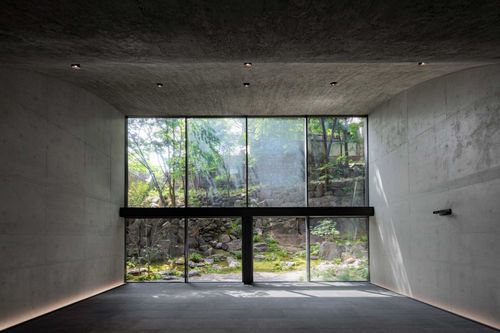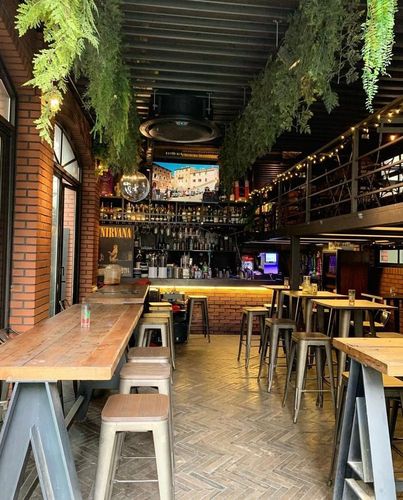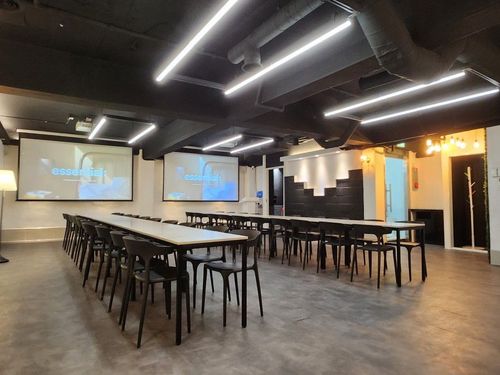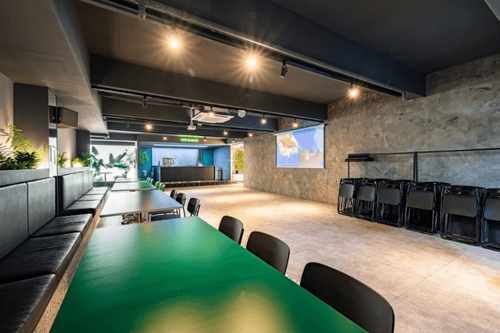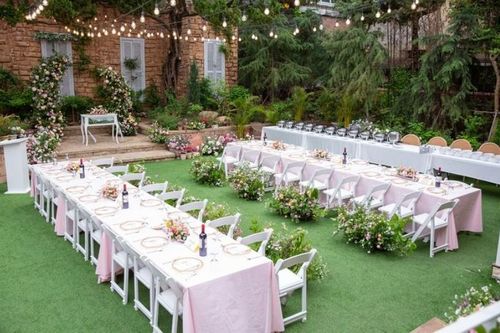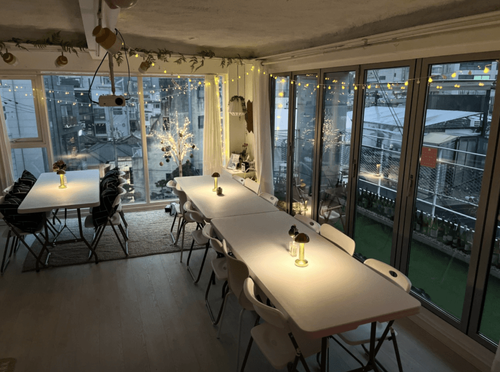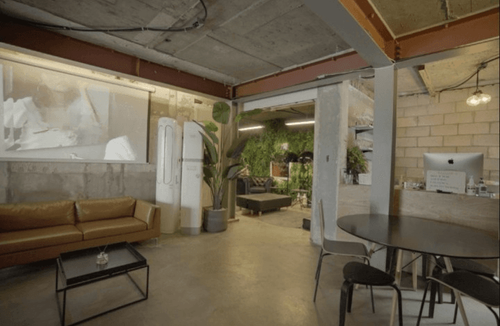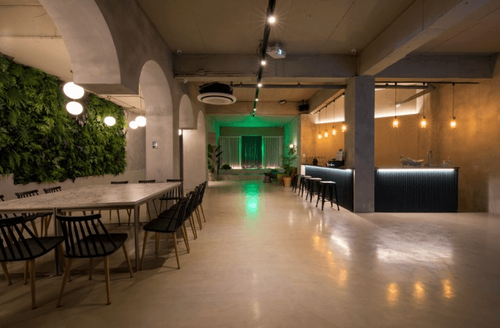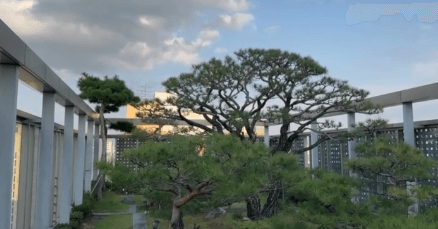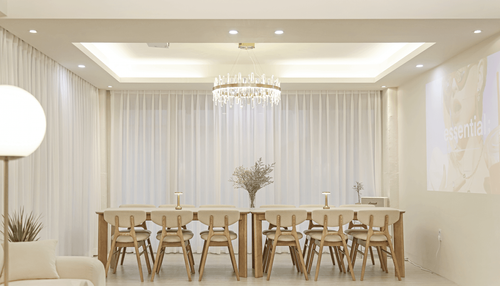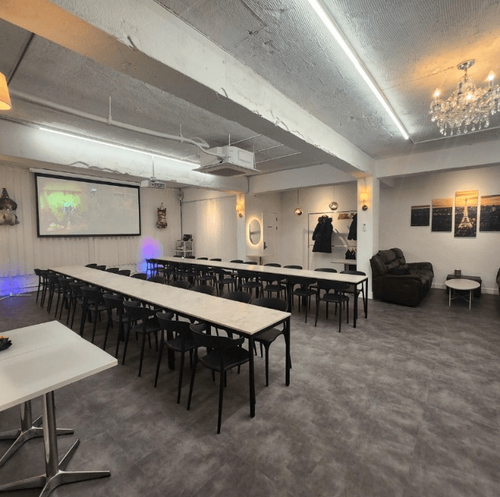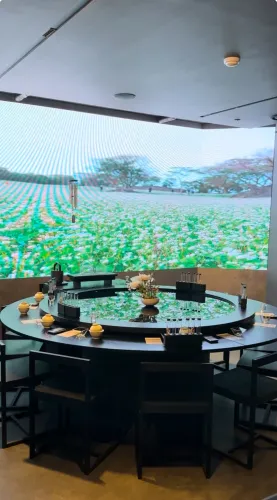Hire Private Dining Rooms in Seoul

Popular Private Dining Rooms in Seoul
Find unique private dining spaces in Seoul
See AllContemporary Chic Venue With Black Interior and Floor-to-Ceiling Windows for Intimate Events
Looking for a venue that blends sleek modernity with stunning river views? Look no further! This Bauhaus-inspired contemporary space in Seoul, featuring chic black interiors and floor-to-ceiling windows with a panoramic view of the Han River, is perfect for... Show More
Industrial Chic Venue With Raw Concrete Steel Beams Perfect for Dinners and Pop-Up Events
Looking for a bold, industrial venue for your next event in Seoul? This hidden gem offers a unique atmosphere perfect for parties, anniversaries, launching events, and private dinners. The venue features raw concrete walls, polished floors, and large windows... Show More
Modern Venue With Blend of Elegance and History for Corporate Events With Stunning Palace Views
Located amidst Seoul's rich tapestry of history and modernity, discover a venue where classical Korean charm meets contemporary sophistication. Imagine hosting your next event in a space adorned with brown and off-white hues, subtly infused with echoes of... Show More
Chic Industrial Cafe With an Outdoor Terrace for Happy Hour Events
This venue seamlessly combines industrial chic with modern urban design, offering a unique and vibrant atmosphere for any type of event. The open-air terrace is the highlight, bathed in bold red neon lighting that creates an electric yet inviting ambience.... Show More
Classy Minimalistic Venue With Chic Interiors
Step into this amazing venue where versatility meets chic sophistication. Situated in Seoul's vibrant landscape, this unique space is perfect for hosting a diverse range of events, from swanky cocktail parties to dynamic workshops and everything in between.... Show More
Modern and Spacious Venue With Tropical Vibes
Planning an unforgettable event in Seoul? This chic, modern venue in Hongdae is the perfect choice! Known for its trendy and vibrant atmosphere, it features modern decor and versatile spaces, ideal for everything from corporate events to cocktail mixers.Locate... Show More
Chic Scandinavian Venue With Han River Views for Versatile Events
Ever thought about hosting your next event with a stunning Han River view? Nestled in the heart of Seoul, this venue boasts a sleek white Scandinavian interior that radiates modern elegance. The minimalist design, characterized by clean lines and natural... Show More
Elegant Modern Venue With Chic Interiors and Outdoor Patio for Versatile Events
Are you searching for the perfect blend of nature and sophistication for your next event in Seoul? Look no further! In the heart of Seoul, this sophisticated venue invites you to experience the most natural and beautiful moments, crafted with our unique touch... Show More
Versatile Event Space With Vibrant Interiors for Corporate Events
Step into a venue where vibrant hues and lush greenery converge in the heart of Seoul's bustling scene. This unique venue boasts an exquisite blend of bright, bold colors and architectural elements adorned with green leaves, creating an atmosphere that... Show More
Chic Venue With Tropical Modern Vibes
Step into a tropical haven with a modern twist at this stunning Seoul venue. Perfect for everything from high-energy galas to intimate dinners, its off-white, breezy ambiance will transport your guests to a chic retreat. The venue’s spacious layout features... Show More
Eclectic Venue with Artistic Flair for Memorable Gatherings
Discover Seoul's premier venue for versatile events with unique creative touches, ideal for cocktail parties, small parties, and more. Nestled near Sangsu Station, it offers a vibrant and energetic setting that enhances any gathering. Step into a world of... Show More
Neon Arcade Hall for Team Celebrations and Launches
This neon arcade hall delivers a high-energy setting for parties, brand activations, and team celebrations. Electric lighting, game consoles, and futuristic visuals set the tone for immersive, play-driven experiences.The open-plan layout includes modular café... Show More
Luxurious Event Venue With Antique Lounge Mood and Mountain Views
Looking for a remarkable spot for your next corporate event in Seoul? This expansive space venue in Jungnang-gu ticks all the boxes: abundant natural light, a private garden, and breathtaking mountain views. The venue exudes a classic, antique lounge atmospher... Show More
Chic Urban Industrial Event Venue With Modern Design
Looking to add a dash of industrial chic to your next event? Look no further than this Seoul venue! With their edgy, raw interiors featuring exposed brick and walls, black beams, and sleek concrete floors, these spaces ooze urban cool. The minimalist design... Show More
Stylish and Versatile Event Space Featuring Modern Amenities
Welcome to your premier venue in Seoul for all your event needs! Whether you're planning a chic cocktail soirée, a productive seminar, or an intimate workshop, this versatile space is your go-to destination. It boasts top-notch amenities and an atmosphere... Show More
Charming Minimalist Venue With Greenery for Intimate Corporate Gatherings
Step into a world where modern minimalist design meets lush greenery at this elegant venue. Located in the heart of Gwanak-gu, this event space boasts an inviting, contemporary aesthetic characterised by its sleek concrete arches and vibrant vertical gardens.... Show More
Sky Garden Rooftop Atrium With Bonsai Clusters and Skyline Views for Wellness Events
Elevated on the 14th floor, this rooftop venue fuses the serenity of a bonsai garden with rustic outdoor charm—an unexpected urban oasis perched between two minimalist light-grey buildings. Rooted in Japanese Zen landscaping and urban contemporary architecture... Show More
Warm and Stylish Event Space With Spacious Wood Terrace
Looking for a spot that’s got that cosy yet chic vibe? Look no further! Nestled right on Hapjeong Cafe Street, this studio and party room offers a warm atmosphere and a stunning wood terrace – perfect for making those special moments unforgettable. Step into... Show More
Versatile Space Venue With Industrial Charm
Experience an exceptional event venue in the heart of Seoul, where industrial charm harmonizes seamlessly with modern design elements. Perfectly suited for corporate events, workshops, and celebrations alike.This versatile venue promises to captivate your... Show More
Contemporary Hidden Zen Nook With Bold LED Wall and Fixed Centrepiece for Intimate Gatherings
Clean lines, meditative stillness, and an ethereal glow define this Contemporary Minimalist tea room—an exceptional private event venue on the first floor designed to evoke serenity through refined simplicity. The centrepiece is a striking 6m-wide by 2m-high... Show More
A Guide to Hosting Private Dining in Seoul
Welcome to Seoul, where the dynamic pulse of the city meets an unforgettable dining experience. If you're looking to host a private dining event as vibrant and exciting as the city itself, you've come to the right place. Seoul isn’t just a metropolis of neon lights and cutting-edge tech; it's also a haven for foodies and event planners seeking a touch of glamour and tradition.
Picture this: an evening where you're not only indulging in top-notch Korean cuisine but also soaking in the panoramic views of the Han River or the dazzling cityscape from a sleek rooftop venue. The Seoul dining scene has undergone a thrilling transformation, with new hotspots popping up faster than you can say "kimchi"! From trendy fusion restaurants reflecting Seoul's ever-evolving culinary landscape to elegant venues steeped in rich Korean tradition, the city offers a spectrum of choices to make your event stand out.
Bonus reading: Beyond its dining scene, Seoul’s museums and art galleries are also worth visiting in this vibrant Korean city.
This guide is your go-to resource for hosting a private dining event in this South Korean capital. We'll navigate you through some of the city's top venues, discuss the costs of renting these venues, different food items to select, and more. So, buckle up and get ready to explore the best of Seoul’s dining scene, where every event promises a memorable adventure!
P.S.: To elevate your corporate dining experience, consider incorporating some of these team-building activities to leave a lasting impression.
1) The Different Styles of Private Dining Rooms in Seoul
Seoul’s private dining rooms come in an impressive array of styles, each offering a unique twist on the city’s rich culinary and cultural tapestry. From ultra-modern spaces designed for sleek corporate gatherings to traditional hanok settings that immerse guests in Korean heritage, there’s a perfect venue for every occasion. Let's dive into five distinct styles of private dining rooms in Seoul, each showcasing a different facet of this vibrant city.
- Contemporary Rooftop Venues: These sleek spaces offer breathtaking panoramic views of Seoul’s skyline, perfect for impressing clients or celebrating special occasions. With floor-to-ceiling windows and modern décor, these venues blend cutting-edge design with a relaxed, open-air atmosphere.
- Traditional Hanok Settings: Experience the charm of Korean heritage in beautifully restored hanoks (traditional Korean houses). These venues feature classic wooden architecture, low tables, and tatami mats, providing an authentic and serene environment for intimate gatherings.
- Fusion Restaurants with Open Kitchen: Embrace Seoul’s culinary innovation in fusion restaurants with open kitchens. Guests can watch chefs craft creative dishes that blend Korean flavours with international influences, adding an interactive dining experience.
- Gourmet Chef’s Table Experiences: For an exclusive touch, consider a private dining experience where a renowned chef prepares a bespoke menu right before your eyes. These intimate settings offer a front-row seat to the artistry of fine dining, making each meal a memorable event.
- Industrial-Chic Loft Spaces: These venues combine raw, urban aesthetics with elegant furnishings, creating a trendy and sophisticated setting. With exposed brick walls and modern amenities, they’re ideal for stylish gatherings and high-profile events.
2) The Best Neighbourhoods for Private Dining Venues in Seoul
Seoul is a city of vibrant neighbourhoods, each offering its unique atmosphere and culinary delights, making it a prime destination for private dining events. Whether you’re looking for a trendy, cosmopolitan vibe or a serene, historic setting, Seoul’s diverse districts have something to offer.
- Gangnam: Known for its upscale vibe and high-end dining options, Gangnam is the perfect spot for sophisticated events. With various luxury restaurants and chic venues, this area is ideal for impressing clients or hosting elegant celebrations.
- Insadong: This historic district blends traditional Korean culture and modern charm. Insadong is home to several hanok-style venues where guests can enjoy a serene, authentic Korean dining experience amidst art galleries and tea houses.
- Itaewon: Itaewon’s cosmopolitan flair and international dining scene make it a go-to destination for diverse culinary experiences. The area’s eclectic mix of fusion restaurants and trendy venues is perfect for hosting events with a global touch.
- Bukchon Hanok Village: For a truly immersive cultural experience, Bukchon Hanok Village offers beautifully preserved traditional Korean houses. This area is perfect for intimate, culturally rich dining events in a historic setting.
- Hongdae: Known for its youthful energy and creative spirit, Hongdae offers a range of unique, artsy venues. From trendy cafes to stylish lofts, this neighbourhood is ideal for hosting casual yet chic dining events that embrace Seoul’s vibrant youth culture.
3) The Cost of Hosting Private Dinner Events in Seoul
When planning a private dinner event in Seoul, understanding the hourly cost of venue rental is key to managing your budget effectively. The cost can vary significantly based on the type of venue you choose. Below are the typical hourly rates for basic, mid-range, and high-end venues.
- Basic Venues (€50 - €100 per hour): Basic venues are perfect for small, informal gatherings or casual dinners. These venues might include cosy cafes, modest local restaurants, or simple banquet rooms that provide the essential amenities needed for your event. While these spaces are budget-friendly, they offer a comfortable environment ideal for more laid-back occasions.
- Mid-Range Venues (€100 - €300 per hour): Mid-range venues balance affordability and quality. These venues are well-suited for corporate dinners, social celebrations, or events requiring sophistication. Typically, these spaces might be trendy bistros, fusion restaurants, or modern dining areas with stylish décor and a broader range of services, ensuring a more polished experience.
- High-End Venues (€300 - €1,000+ per hour): High-end venues cater to those seeking an exceptional and luxurious experience. These venues include fine dining establishments, exclusive hotel banquet halls, or private rooms with stunning views. You can expect top-notch service, gourmet cuisine, and an impressive ambience perfect for high-profile events or special occasions where only the best will suffice.
Additional Costs to Keep in Mind:
- Catering or Meal Costs
- Beverages
- Service Charges
- Décor and Setup
- Entertainment
- Transportation
4) The Selection of Local Delicacies You Can Offer at Your Private Dinner Party
One of the highlights of hosting a private dinner event in Seoul is the opportunity to showcase Korean cuisine's rich and diverse flavours. Whether you’re aiming to impress your guests with traditional dishes or offering them a taste of Korea’s culinary creativity, selecting the right local delicacies is essential. Here are five must-serve Korean dishes that will elevate your private dinner party and leave a lasting impression on your guests.
- Galbi (Korean BBQ Short Ribs): Galbi is a quintessential Korean dish with marinated beef short ribs grilled to perfection. The savoury and slightly sweet flavours, combined with the tender texture of the meat, make it a crowd-pleaser at any event. It’s an excellent choice for those looking to offer a hearty and authentic Korean BBQ experience.
- Bibimbap (Mixed Rice with Vegetables): Bibimbap is a vibrant and healthy dish that’s as visually appealing as it is delicious. It consists of rice topped with various sautéed vegetables, a fried egg, and sliced meat mixed with a spicy gochujang (red chilli paste) sauce. This dish is perfect for guests who appreciate a balanced, flavourful meal.
- Japchae (Stir-Fried Glass Noodles): Japchae is a popular Korean dish made from sweet potato glass noodles stir-fried with vegetables, mushrooms, and meat. It is known for its slightly sweet and savoury taste and colourful presentation. Japchae is a versatile dish that can be served hot or cold, making it an excellent choice for any season.
- Kimchi (Fermented Vegetables): No Korean meal is complete without kimchi, the country’s iconic fermented vegetable dish. Typically made from Napa cabbage and radishes, kimchi adds a tangy, spicy kick to any meal. Serving kimchi at your event provides a taste of Korea’s most famous side dish and complements a variety of other dishes on the menu.
- Samgyetang (Ginseng Chicken Soup): Samgyetang is a nourishing soup made with whole young chicken stuffed with glutinous rice, ginseng, garlic, and jujubes. This dish is traditionally enjoyed during summer, but its rich flavours and health benefits make it a fantastic choice for any occasion. It offers a comforting and hearty option that’s sure to satisfy your guests.
Wrapping Up
That wraps up our guide to private dining in Seoul. Planning your event should be an exciting journey, and if you need a hand, our local team is here to assist you every step of the way. With their in-depth knowledge of Seoul, they can help you discover the perfect venues to bring your ideas to life and ensure your event is truly unforgettable!

FAQs about Seoul Private Dining
English is moderately spoken in Seoul, especially in tourist areas, hotels, and restaurants that cater to international guests. Many younger Koreans and hospitality industry professionals have a basic to good command of English, making it relatively easy for international visitors to navigate the city. However, English proficiency can vary outside of central or tourist-heavy areas, so it's often helpful to know some basic Korean phrases or have a translation app on your phone.
In Seoul, restaurant closing times vary, but many places typically stay open until 10:00 or 11:00 PM. However, in popular areas like Hongdae, Itaewon, and Gangnam, numerous eateries, including restaurants with private rooms, stay open much later, sometimes until midnight or even 2:00 AM. For those seeking a late-night bite, Seoul’s vibrant dining scene offers plenty of options well into the night.
Tipping is optional in Seoul and is generally not expected. In South Korea, service charges are often included in the bill at restaurants, hotels, and other service establishments, so there’s no need to leave an additional tip. In fact, attempting to tip might even be confusing or politely declined by the staff.
However, if you receive exceptional service and want to show your appreciation, a small gesture, such as discreetly leaving a tip or offering a kind word, can be appreciated, though it’s unnecessary.
Korean cuisine features a variety of ingredients and flavours, but there are some common dietary restrictions and allergens to be aware of. Soy and wheat products, such as soy sauce and fermented pastes, are prevalent, so individuals with soy or gluten allergies should exercise caution.
Additionally, some dishes contain seafood, which can be a concern for those with seafood allergies. Korean cuisine also frequently uses garlic and sesame, which may affect those with sensitivities. It’s important to communicate any dietary restrictions or allergies to your venue in advance, as many Korean restaurants are accommodating and can adjust dishes to meet specific needs.
